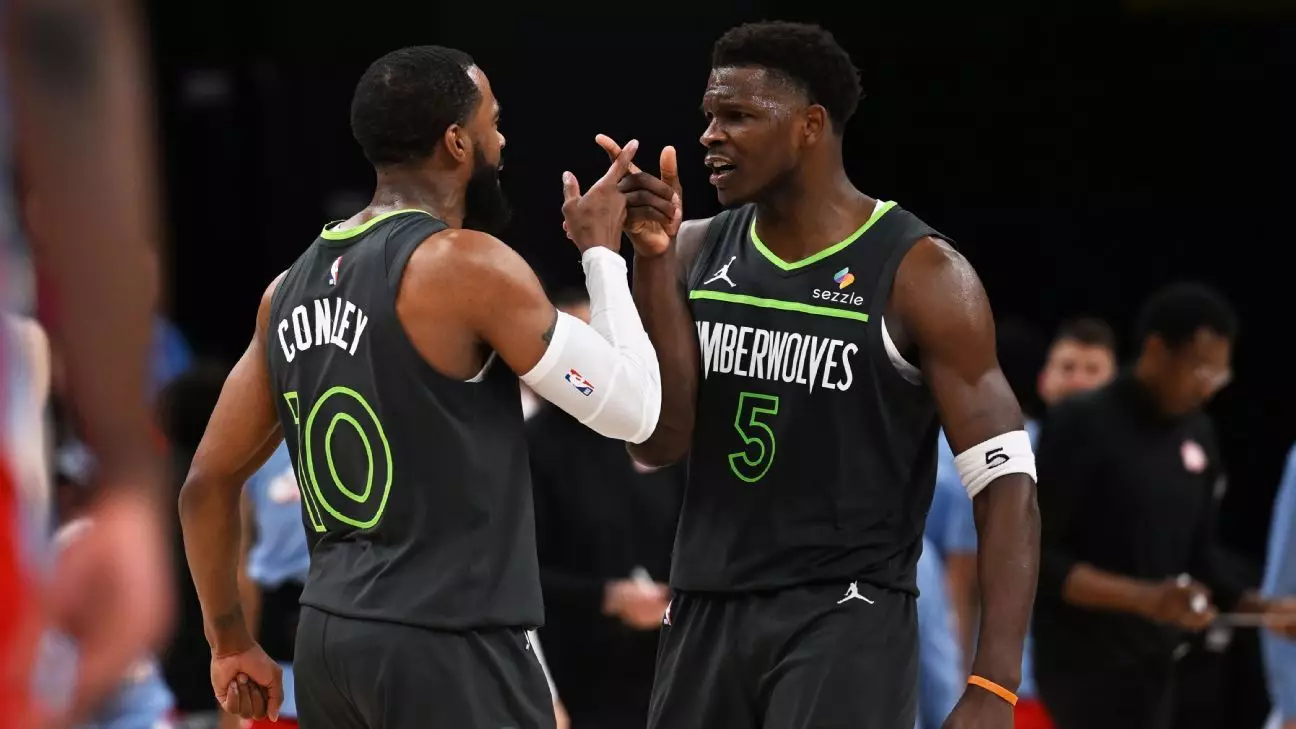In the world of professional sports, where every moment can tilt the balance of a season, the Minnesota Timberwolves found themselves on a precarious edge this past weekend. The team’s face of the future, Anthony Edwards, was nearly sidelined for their crucial final game due to a technical foul that could have automatically suspended him for the regular season’s conclusion. The NBA’s decision to rescind that foul not only spared Edwards from an unwelcome absence but also highlighted deep-rooted issues surrounding officiating, player conduct, and the league’s disciplinary processes.
This situation has raised serious questions. Is the technical foul system—developed ostensibly to maintain respect and sportsmanship on the court—really serving the best interests of the game, or is it merely a heavy-handed mechanism that punishes players for momentary lapses in judgment?
The Fine Line of Expression
Edwards, known for his thrilling style of play and vocal demeanor, expressed his discontent with a referee’s call that he perceived as unjust. While many might condone his reaction—one shared by countless players across all levels of competitive sports—the consequences for such outbursts can be harsh and immediate. Given that this technical foul was his 18th of the season, it starkly illustrates how little room for error players often have in a league steeped in rigid regulations.
Critics, including Edwards himself and Timberwolves coach Chris Finch, have noted the ambiguity surrounding what constitutes “overly demonstrative” behavior. In this incident, Edwards’ reaction was neither violent nor malicious; it was simply a young man’s frustration directed at a momentary lapse in officiating. Does the system excel in enforcing accountability, or does it suppress the emotional authenticity that fuels the passion of the players?
Financial Penalties: The Price of Passion
Compounding the issue is the unsettling fact that Edwards has previously been fined up to a staggering $320,000 for a slew of infractions throughout the season. Such financial penalties for seemingly minor incidents leave one wondering: at what point does safeguarding the sanctity of the game transform into a cold monetization of player emotions? This existential dilemma is especially pronounced in the context of a league that prides itself on showcasing a rich tapestry of individual personalities and diverse expressions.
In a way, these excessive fines serve as a form of shackling; they stifle players’ genuine reactions under the threat of financial penalties. Since when did the league prioritize perceived decorum over the excitement and passion that inherently draw fans to the sport? Could this reliance on punitive measures ultimately backfire by alienating players and fans alike?
A Broader Reflection on League Culture
The NBA’s climate surrounding officiating and punishment also reflects broader societal trends. In an era where accountability feels strained, where social media can amplify a moment of passion into a nationwide conversation, how do we navigate these complexities? Edwards’ situation lays bare the inconsistencies in expectations placed upon players, often limiting legitimate expressions of frustration while maintaining high standards for decorum.
Fans rally behind players like Edwards precisely because they are unfiltered—real people living on the cusp of extraordinary pressure. When Edwards professed hope that the technical would be rescinded, it seemed to encapsulate not just relief, but a plea for fairness under the league’s rules. How often will such pleas go unheard?
The Importance of Flexibility and Clarity
Ultimately, the Timberwolves’ narrow escape from a tough situation presents a call for the NBA to reconsider its rigid approach to technical fouls. Clarity in officiating, alongside a more empathetic understanding of player emotions, can pave the way for a more balanced relationship between athletes, referees, and the league at large.
In an age where players are increasingly active in advocating for themselves and their communities, the dynamic between expression and control within sports will require re-evaluation. For the Timberwolves and the broader league, every technical foul and its subsequent fallout presents an opportunity for growth; perhaps it’s time for the rules to evolve alongside the game itself.


Leave a Reply